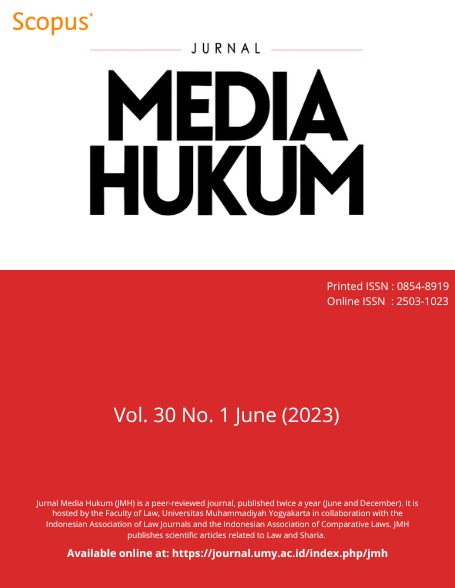Public Participation in the Law-Making Process in Indonesia
DOI:
https://doi.org/10.18196/jmh.v30i1.14813Keywords:
Democracy, corruption eradication commission, Indonesia, law-making, public participationAbstract
Participation from the general public is an essential component that must be taken into account during the legislative process. It is essential to the operation of laws in a country and includes the participation of society in the legislative process. This is particularly important in terms of the rule of law, the hierarchy of legal norms, and the operation of the law in its entirety. The purpose of this research is to evaluate the significance of public participation in the legislative process in Indonesia as well as the potential repercussions of excluding this procedure from the legislative process. For the purpose of carrying out this research, normative legal research that takes both a statutory and conceptual strategy was utilized. According to the findings, public participation offers a variety of possibilities for involvement, in accordance with the requirements of Article 96 of Law Number 11 of 2012 on the Formation of Regulations (UU P3). Due to this, the importance of public participation cannot be overstated, despite the restricted channels through which members of the public can communicate their thoughts and goals.
References
Abbott, Kenneth W, and Duncan J Snidal, eds., The Spectrum of International Institutions (Routledge, 2021) https://doi.org/10.4324/9781003111719
Arifin, Saru, ‘Illiberal Tendencies in Indonesian Legislation: The Case of the Omnibus Law on Job Creation’, The Theory and Practice of Legislation, 9.3 (2021), 386–403 https://doi.org/10.1080/20508840.2021.1942374
Bellamy, Richard, ed., Constitutionalism and Democracy (Routledge, 2017) https://doi.org/10.4324/9781315095455
Bronner, Stephen Eric, and Douglas Mackay Kellner, eds., Critical Theory and Society A Reader (Routledge, 2020) https://doi.org/10.4324/9781003059509
Butt, Simon, and Sofie Arjon Schütte, ‘Assessing Judicial Performance in Indonesia: The Court for Corruption Crimes’, Crime, Law and Social Change, 62.5 (2014), 603–19 https://doi.org/10.1007/s10611-014-9547-1
Ciravegna, Monia, ‘Ubi Societas, Ibi Ius: The Legal System’, in Damanhur (Cham: Springer International Publishing, 2023), pp. 75–96 https://doi.org/10.1007/978-3-031-10137-3_4
Díaz-Cayeros, Alberto, Beatriz Magaloni, and Alexander Ruiz-Euler, ‘Traditional Governance, Citizen Engagement, and Local Public Goods: Evidence from Mexico’, World Development, 53 (2014), 80–93 https://doi.org/10.1016/j.worlddev.2013.01.008
Esaiasson, Peter, and Christopher Wlezien, ‘Advances in the Study of Democratic Responsiveness: An Introduction’, Comparative Political Studies, 50.6 (2017), 699–710 https://doi.org/10.1177/0010414016633226
Fukuyama, Francis, ‘Corruption as a Political Phenomenon’, in Institutions, Governance and the Control of Corruption (Cham: Springer International Publishing, 2018), pp. 51–73 https://doi.org/10.1007/978-3-319-65684-7_3
Greve, Carsten, ‘Ideas in Public Management Reform for the 2010s. Digitalization, Value Creation and Involvement’, Public Organization Review, 15.1 (2015), 49–65 https://doi.org/10.1007/s11115-013-0253-8
Hartono, Bambang, ‘Corruption Eradication Policy Judging from the Politics of Criminal Law (Law Number 19 of 2019 On the Second Amendment to Law Number 30 of 2002 On the Corruption Eradication Commission)’, in Proceedings of the International Conference on Law, Economics and Health (ICLEH 2020) (Paris, France: Atlantis Press, 2020) https://doi.org/10.2991/aebmr.k.200513.106
Isra, Saldi, Yuliandri, Feri Amsari, and Hilaire Tegnan, ‘Obstruction of Justice in the Effort to Eradicate Corruption in Indonesia’, International Journal of Law, Crime and Justice, 51 (2017), 72–83 https://doi.org/10.1016/j.ijlcj.2017.07.001
Khurniawan, Filip Stephanus, and Yova Ruldeviyani, ‘Twitter Sentiment Analysis: Case Study on the Revision of the Indonesia’s Corruption Eradication Commission (KPK) Law 2019’, in 2020 International Conference on Data Science and Its Applications (ICoDSA) (IEEE, 2020), pp. 1–6 https://doi.org/10.1109/ICoDSA50139.2020.9212851
Kurniawan, Danang, Achmad Nurmandi, Salahudin, Dyah Mutiarin, and Suswanta, ‘Analysis of the Anti-Corruption Movement Through Twitter Social Media: A Case Study of Indonesia’, 2021, pp. 298–308 https://doi.org/10.1007/978-3-030-71782-7_27
Luttrell, Cecilia, Ida Aju Pradnja Resosudarmo, Efrian Muharrom, Maria Brockhaus, and Frances Seymour, ‘The Political Context of REDD+ in Indonesia: Constituencies for Change’, Environmental Science & Policy, 35 (2014), 67–75 https://doi.org/10.1016/j.envsci.2012.10.001
Mar, MaksymilianDel, Legal Theory and the Social Sciences, ed. by Del Mar Maksymilian and Michael Giudice (Routledge, 2017) https://doi.org/10.4324/9781315091891
Marsden, Chris, Trisha Meyer, and Ian Brown, ‘Platform Values and Democratic Elections: How Can the Law Regulate Digital Disinformation?’, Computer Law & Security Review, 36 (2020), 105373 https://doi.org/10.1016/j.clsr.2019.105373
McNamara, Luke, Julia Quilter, Russell Hogg, Arlie Loughnan, Heather Douglas, David Brown, and others, ‘Understanding Processes of Criminalisation: Insights from an Australian Study of Criminal Law-Making’, Criminology & Criminal Justice, 21.3 (2021), 387–407 https://doi.org/10.1177/1748895819868519
Mietzner, Marcus, ‘Sources of Resistance to Democratic Decline: Indonesian Civil Society and Its Trials’, Democratization, 28.1 (2021), 161–78 https://doi.org/10.1080/13510347.2020.1796649
Mudhoffir, Abdil Mughis, ‘The Limits of Civil Society Activism in Indonesia: The Case of the Weakening of the KPK’, Critical Asian Studies, 2022, 1–21 https://doi.org/10.1080/14672715.2022.2123019
Mudhoffir, Abdil Mughis, and Rafiqa Qurrata A’yun, ‘Doing Business under the Framework of Disorder: Illiberal Legalism in Indonesia’, Third World Quarterly, 42.11 (2021), 2651–68 https://doi.org/10.1080/01436597.2021.1967738
O’Connor, Siobhan, Peter Hanlon, Catherine A. O’Donnell, Sonia Garcia, Julie Glanville, and Frances S. Mair, ‘Understanding Factors Affecting Patient and Public Engagement and Recruitment to Digital Health Interventions: A Systematic Review of Qualitative Studies’, BMC Medical Informatics and Decision Making, 16.1 (2016), 120 https://doi.org/10.1186/s12911-016-0359-3
Reiche, B. Sebastian, Günter K. Stahl, Mark E. Mendenhall, and Gary R. Oddou, eds., Readings and Cases in International Human Resource Management (Routledge, 2016) https://doi.org/10.4324/9781315668703
Saud, Muhammad, and Hendro Margono, ‘Indonesia’s Rise in Digital Democracy and Youth’s Political Participation’, Journal of Information Technology & Politics, 18.4 (2021), 443–54 https://doi.org/10.1080/19331681.2021.1900019
Scammell, Margaret, and Holli Semetko, The Media, Journalism and Democracy, ed. by Margaret Scammell and Holli Semetko (Routledge, 2018) https://doi.org/10.4324/9781315189772
Schütte, Sofie Arjon, ‘Keeping the New Broom Clean’, Bijdragen Tot de Taal-, Land- En Volkenkunde / Journal of the Humanities and Social Sciences of Southeast Asia, 171.4 (2015), 423–54 https://doi.org/10.1163/22134379-17104001
Serra-Silva, Sofia, ‘How Parliaments Engage with Citizens? Online Public Engagement: A Comparative Analysis of Parliamentary Websites’, The Journal of Legislative Studies, 28.4 (2022), 489–512 https://doi.org/10.1080/13572334.2021.1896451
Sharma, Rajeev, Sunil Mithas, and Atreyi Kankanhalli, ‘Transforming Decision-Making Processes: A Research Agenda for Understanding the Impact of Business Analytics on Organisations’, European Journal of Information Systems, 23.4 (2014), 433–41 https://doi.org/10.1057/ejis.2014.17
Stilgoe, Jack, Simon J. Lock, and James Wilsdon, ‘Why Should We Promote Public Engagement with Science?’, Public Understanding of Science, 23.1 (2014), 4–15 https://doi.org/10.1177/0963662513518154
Syahuri, Taufiqurrohman, Gazalba Saleh, and Mayang Abrilianti, ‘The Role of the Corruption Eradication Commission Supervisory Board within the Indonesian Constitutional Structure’, Cogent Social Sciences, 8.1 (2022) https://doi.org/10.1080/23311886.2022.2035913
Tegnan, Hilaire, Lego Karjoko, Jaco Barkhuizen, and Anis H Bajrektarevic, ‘Mining Corruption and Environmental Degradation in Indonesia: Critical Legal Issues’, BESTUUR, 9.2 (2021), 90 https://doi.org/10.20961/bestuur.v9i2.55219
Toepler, Stefan, Annette Zimmer, Christian Fröhlich, and Katharina Obuch, ‘The Changing Space for NGOs: Civil Society in Authoritarian and Hybrid Regimes’, VOLUNTAS: International Journal of Voluntary and Nonprofit Organizations, 31.4 (2020), 649–62 https://doi.org/10.1007/s11266-020-00240-7
Tyler, Tom R., Phillip Atiba Goff, and Robert J. MacCoun, ‘The Impact of Psychological Science on Policing in the United States’, Psychological Science in the Public Interest, 16.3 (2015), 75–109 https://doi.org/10.1177/1529100615617791
Umam, Ahmad Khoirul, Gillian Whitehouse, Brian Head, and Mohammed Adil Khan, ‘Addressing Corruption in Post-Soeharto Indonesia: The Role of the Corruption Eradication Commission’, Journal of Contemporary Asia, 50.1 (2020), 125–43 https://doi.org/10.1080/00472336.2018.1552983
Widojoko, Johanes D., ‘Indonesia’s Anticorruption Campaign’, in The Changing Face of Corruption in the Asia Pacific (Elsevier, 2017), pp. 253–66 https://doi.org/10.1016/B978-0-08-101109-6.00017-4
Wiratraman, Herlambang P, ‘Constitutional Struggles and the Court in Indonesia’s Turn to Authoritarian Politics’, Federal Law Review, 50.3 (2022), 314–30 https://doi.org/10.1177/0067205X221107404
Yoshizawa, Go, Calvin Wai-Loon Ho, Wei Zhu, Chingli Hu, Yoni Syukriani, Ilhak Lee, and others, ‘ELSI Practices in Genomic Research in East Asia: Implications for Research Collaboration and Public Participation’, Genome Medicine, 6.5 (2014), 39 https://doi.org/10.1186/gm556










